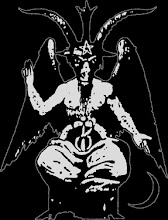
With their first two offerings, Germany's Bethlehem established a style of music that really defied all traditional labels, so much so that their music was known as Dark Metal. The band's approach blended elements of Black, Death and Doom Metal to create something so dark and miserable that it likely pushed a good number of unfortunate souls to an untimely end. In March 1998, Bartsch and Matton (aided by a new line-up) returned with the third morbid chapter of Bethlehem's career, titled Sardonischer Untergang im Zeichen irreligiöser Darbietung (S.U.i.Z.i.D., for short). It was at this point that they lost me. Unlike Dark Metal and Dictius Te Necare, this record fails to create a dark and miserable feeling and is far too experimental for its own good. There are a few good ideas, here and there, but they are buried inside this hideous and foul exercise in mainstream flirtation.
The prevailing atmosphere of this L.P. is one of failure and missed opportunities. There is an overwhelming sense of misery and despair that is conveyed by some of the material, yet the majority is laughable and hard to stomach. There are some stylistic changes that make quite a difference in the overall presentation. In a sense, this record is the beginning of Bethlehem's experimental phase. While the music still consists of a mixture of mid-paced doom riffs and fast tremolo melodies, interrupted by woeful clean guitar passages, there are some riffs that sound more rock-based and several aspects that give the album a gothic vibe. A handful are even reminiscent of the type used on Katatonia's Brave Murder Day. Also, the drumming is somewhat mechanical and overactive, at times, which gives the album hints of an industrial feeling. The vocals are another source of disappointment. Marco Kehren's performance is not that bad, but he fails to really do anything to stand out from the band's previous vocalists. In fact, he seems to be trying his best to mimic Landfermann's tormented howls, from Dictius Te Necare. His attempt is a little over-the-top, but not horrible. On the other hand, the clean vocals are utterly ridiculous. His voice has a comically deep tone, the sort that cartoon vampires use, which does nothing but add an unnecessary layer of cheesiness to the proceedings. Even worse, the band recruited a woman to pollute much of S.U.i.Z.i.D. with her worthless goth mumblings. This, along with the overuse of the softer parts, helps to soil what could have been a decent album.
The songwriting is absolutely atrocious. There is one good song on here, being "Durch befleckte Berührung memer Nemesis". Starting out with this track, one would expect a continuation of Dictius Te Necare. Sadly, only disappointment would follow. "Du sollst dich töten" is passable, but the drumming and the clean vocals really hold it back from being as good as it could have been. Similarly, "Luftstehs'Ibläh" is also somewhat alright, though some of the riffs kill its momentum. The rest of the songs are pure trash, ruined by clean vocals, female rambling and incredibly inconsistent compositions.
On top of all of the other problems that hold this record back from being worthwhile, the production is far too clean and overdone. The drumming is too high in the mix, only making more obvious the many poor choices regarding percussion. Dictius Te Necare was a little too overproduced for its own good, but the quality of the material made up for it. In this case, going further in that direction was just another in a long line of bad decisions. Everything is too polished and sterile, which does not work in favour of a record whose success hinges on its ability to create a bleak, dismal atmosphere or imbue the listener with dark feelings.
In the end, S.U.i.Z.i.D. is a terrible album that should have been much more. The addition of the goth / industrial elements makes this one difficult to take seriously, at times, which is a death sentence for this style of music. As well, the fake and plastic production would have ruined it, regardless of how the songwriting turned out. In many ways, Bethlehem tried too hard, losing the genuine darkness that made their first two efforts so successful. Those new to this band should bear in mind that Dark Metal and Dictius Te Necare are the only essential releases, with the rest being rather worthless by comparison.
The prevailing atmosphere of this L.P. is one of failure and missed opportunities. There is an overwhelming sense of misery and despair that is conveyed by some of the material, yet the majority is laughable and hard to stomach. There are some stylistic changes that make quite a difference in the overall presentation. In a sense, this record is the beginning of Bethlehem's experimental phase. While the music still consists of a mixture of mid-paced doom riffs and fast tremolo melodies, interrupted by woeful clean guitar passages, there are some riffs that sound more rock-based and several aspects that give the album a gothic vibe. A handful are even reminiscent of the type used on Katatonia's Brave Murder Day. Also, the drumming is somewhat mechanical and overactive, at times, which gives the album hints of an industrial feeling. The vocals are another source of disappointment. Marco Kehren's performance is not that bad, but he fails to really do anything to stand out from the band's previous vocalists. In fact, he seems to be trying his best to mimic Landfermann's tormented howls, from Dictius Te Necare. His attempt is a little over-the-top, but not horrible. On the other hand, the clean vocals are utterly ridiculous. His voice has a comically deep tone, the sort that cartoon vampires use, which does nothing but add an unnecessary layer of cheesiness to the proceedings. Even worse, the band recruited a woman to pollute much of S.U.i.Z.i.D. with her worthless goth mumblings. This, along with the overuse of the softer parts, helps to soil what could have been a decent album.
The songwriting is absolutely atrocious. There is one good song on here, being "Durch befleckte Berührung memer Nemesis". Starting out with this track, one would expect a continuation of Dictius Te Necare. Sadly, only disappointment would follow. "Du sollst dich töten" is passable, but the drumming and the clean vocals really hold it back from being as good as it could have been. Similarly, "Luftstehs'Ibläh" is also somewhat alright, though some of the riffs kill its momentum. The rest of the songs are pure trash, ruined by clean vocals, female rambling and incredibly inconsistent compositions.
On top of all of the other problems that hold this record back from being worthwhile, the production is far too clean and overdone. The drumming is too high in the mix, only making more obvious the many poor choices regarding percussion. Dictius Te Necare was a little too overproduced for its own good, but the quality of the material made up for it. In this case, going further in that direction was just another in a long line of bad decisions. Everything is too polished and sterile, which does not work in favour of a record whose success hinges on its ability to create a bleak, dismal atmosphere or imbue the listener with dark feelings.
In the end, S.U.i.Z.i.D. is a terrible album that should have been much more. The addition of the goth / industrial elements makes this one difficult to take seriously, at times, which is a death sentence for this style of music. As well, the fake and plastic production would have ruined it, regardless of how the songwriting turned out. In many ways, Bethlehem tried too hard, losing the genuine darkness that made their first two efforts so successful. Those new to this band should bear in mind that Dark Metal and Dictius Te Necare are the only essential releases, with the rest being rather worthless by comparison.
.jpg)


